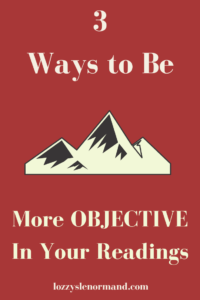 It’s a little too easy to be TOO subjective when you’re reading, especially when you’re reading for yourself.
It’s a little too easy to be TOO subjective when you’re reading, especially when you’re reading for yourself.
It can be so hard to distance yourself from what you WANT to see, rather than what you DO see.
A number of my readers have mentioned about how difficult they find it to stay objective. I thought I’d write a post to help, and give you three practical tips for dealing with the issue:
1. Be systematic, take the reading step-by-step
Those of you who prefer a dreamy kind of vibe might find this difficult, but I find that letting my logic-brain kick in and making myself read the cards I see systematically FIRST really helps me get the distance I need. Only THEN do I let my creative/intuitive brain put it together into a story.
You have to literally follow the step by step instructions in any reading, being particularly careful to make sure you read ALL the cards. Make yourself do it. This is unlikely to work if you’re just doing it verbally, so yes, you will need to write it all down.
Sure, it’s not as sexy, it doesn’t have a lot of mystique and it’s not something you’re going to be doing sitting in front of someone, but seriously, it’s a great method. Check out the layout guides and my example of a 5-card interpretation report for guidance as to how you can approach it.
The act of doing the reading step by step, however slow, will force you to consider every single card. It will stop you getting lost in your subjective feelings, or confused by them, or skipping over things because you don’t really want to see them.
Only once you’re done and you’ve made sure you’ve covered every single card and combination, then you can start to put together what it may be saying into more of a story format.
2. Journal about the issue in hand BEFORE doing any readings
This is one for you if you’re someone who does their own readings, and especially for those times when you are feeling very emotional and all over the place. Is your reading on very emotive subject or in which you’re heavily invested?
If you want to do a reading because you’ve got that ‘frenzied’ sort of feeling, the answer’s simple: yes, you are too heavily invested and are relying on the cards too much.
The cards are probably not going to help you in this situation because your mind is simply not clear enough to deal with it objectively. You need to deal with the problem first so that you can come to the cards with a clear head.
A Way To Journal
A great, practical way to help ‘clear’ your mind of this kind of frenzy about any issue is to sit down and journal about it before going anywhere near a deck of cards. NOT in any slow, considered or analytic way, but instead, in a totally mad ‘don’t-take-your-pen-off-the-page’ or ‘fingers off the keyboard’ kind of way.
Ever heard of Julia Cameron’s book The Artist’s Way & of Morning Pages? If so— yeah, that. I’d highly recommend it as a method.
If you haven’t heard of them, Morning Pages are a great creative-mind journalling tool for basically letting everything out, removing those internal “woulda, shoulda” telling off type thoughts, and ultimately freeing yourself to process your own problems. They’re intended as a creativity tool, but have hugely therapeutic effects too and can be used by anyone for anything, so not just artists, writers or creatives. They are GREAT for helping solve problems and for building intuition, and particularly in situations where you feel desperate, frenzied, or stuck.
Bear in mind, these pages aren’t about writing anything you can look back on, or “good writing”, and in fact, are not meant to be read back at all. So we’re talking less of a diary, more of a kind of fast-paced meditative tool.
Basically, what you do is this:
- Pick a time when you won’t be disturbed. You’ll need about half an hour. The ideal time is first thing in the morning when you’ve just woken up and your brain is kind of fuzzy, but any time will do.
- Get an A4 notebook and a pen OR you can also type it (some people don’t find this as effective but I’ve never had a problem, although you’ll need to be a touch-typist because you have to be super-fast!)
- If you are writing, you’ll be filling three pages of A4. If you are typing, you need to do around 750 words.
- Now, this is all about being FAST. Think of the issue in hand and start writing or typing. Do not take your pen off the page or your fingers off the keyboard. Do NOT stop at any point look at what you’re writing (if you’re typing, you can even white out the font to really go for it). Go forward, always. The messier, the better. You won’t be reading it back anyway, so it doesn’t matter at all if you can’t even read your own handwriting.
- If you don’t know what to write, put “I don’t know what to write.” You can keep on repeating that if you want, and your brain will likely get bored and start wanting to say something. It doesn’t matter one bit if you go off topic, and in fact, you probably will. But DO NOT stop. Don’t “think things up.” Just write all the way to the end of the three pages or the 750 words. Then STOP. Have a breather. Phew.
What you’ll tend to find, especially if you do this regularly, is that something has shifted. Your mind starts working through issues all by itself. Journaling like this tends to let the emotional steam out of situations and helps clear your head or see things in new ways. You should end the journalling session feeling a LOT calmer and more open: both of which are great for objectivity AND for solving problems.
3. Pretend You’re Reading For an Unknown Stranger
You have to find a way of reading AS IF the person isn’t actually you (or your friend, if you’re reading for someone you know.)
You know those fairy tales where the main character meets some unlikely individual (a frog, a beggar) and they are ‘tested’ in some way before they can be rewarded? Imagine someone random came in off the street and wanted a reading from you and these were the cards you pulled. Imagine it was a kind of test, but you don’t know what they’re looking for in terms of right and wrong answers, they just wanted you to be absolutely honest and they’ll KNOW if you’re not. You only know the question and context. You can even give this person an imaginary name if you want. Anything to put a distance between yourself and your subjective feelings and wishes and these cards.
Now perform the reading as if it was for this person and not for you or your friend. Remember, the only rule is you must be as honest as possible, and you must pick up on EVERYTHING.
So there you go! Those are my top tips.
Do let me know in the comments below if you have discovered any more!
Do You Need More Guidance?
Go to my Lenormand Tips page for more tips about common issues and problems.
For a FREE card combinations PDF E-Book, sign up to my mailing list for weekly newsletters and other freebies. If you don’t want to sign up, it’s also available in both paperback and ebook format from Amazon as well as other ebook platforms.
Also, my Complete Guide to Lenormand e-book as well as my Love and Careers workbooks are now available from Amazon, Kobo, Barnes & Noble, Apple Books & other ebook platforms and are all also available as downloadable/printable PDFs here in the SHOP!
Stuck? Want Me To Help Interpret one of YOUR readings?
As well as doing personal readings, I can also help you interpret your very own readings: your own layouts you’ve done with your own cards. If you’d like some help, please see my service pages here for how to order. You can check out samples of some reports here:
